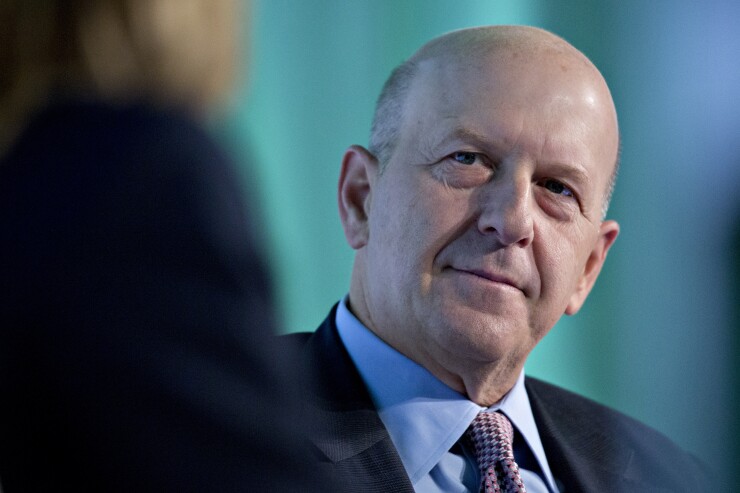Receiving Wide Coverage ...
Kicking off the white shoes
Goldman Sachs said it is

The move was “once considered unimaginable for the Wall Street firm’s leagues of monk-shoed partners and bankers in bespoke suits. Historically known as a white-shoe investment bank, Goldman Sachs traditionally required formal business attire. But since 2017, the bank
To the rescue
The “American with the toughest job in finance” is Cerberus Capital president Matt Zames, according to the Wall Street Journal. Zames, who “helped steer JPMorgan Chase through the ‘London Whale’ trading debacle and was considered a possible successor to its chief, James Dimon,” “now has
“If Mr. Zames succeeds, he’d not only be helping to rescue Deutsche Bank from a years long slide. He’d also be salvaging a soured bet by Cerberus itself, which in 2017 disclosed a roughly 3% stake in the bank. The investment was then valued at about $1.1 billion. It’s worth about half that now.”
“The momentum towards a merger of Deutsche Bank and domestic German rival Commerzbank looks increasingly unstoppable,” but “given the operational weakness of both banks, and a challenging home market, a deal looks
Wall Street Journal
Work in progress
Wells Fargo named Maria Teresa Tejada as its chief strategic enterprise risk officer, “the latest move by the embattled lender to
Change of PACE
“Following a rare collective push from bipartisan lawmakers, banking industry groups and consumer advocates for a new regulation,” the Consumer Financial Protection Bureau is preparing to crack down on lenders who make Property Assessed Clean Energy, or PACE, loans. Under the new rule, which the CFPB is taking public comment on, private lenders in the government-backed program could face the same requirements as mortgage lenders. “PACE loans have grown rapidly in recent years, allowing hundreds of thousands of homeowners to finance energy-saving projects — such as solar panels, window insulation and air-conditioning units — without initial payments. But with their lenders facing few restrictions, the number of buyers facing difficulty making repayments and complaining about
Full speed ahead
Switzerland’s central bank “defended its issuance of one-thousand-franc ($999) notes, launching a new series when
“We have no indications at present that high denomination bank notes, or in particular the thousand franc bill, is more risk prone to use for criminal purposes,” said Fritz Zurbrügg, the Swiss National Bank’s vice chairman.
Back on the agenda
The Federal Deposit Insurance Corp., Office of the Comptroller of the Currency and the Federal Reserve “are discussing reviving a proposal that would
Financial Times
Now it’s Austria’s turn
The Nordic money-laundering scandal moved south on Tuesday, this time to Austria, “after a prominent Kremlin critic filed a complaint urging Vienna prosecutors to investigate $967 million of suspicious money flows from Danske Bank to Raiffeisen [Bank] and other lenders in the country. Bill Browder, an anti-money-laundering activist and investor, said Austrian banks had for years ignored red flags and
“The entire Nordic-Baltic dirty money scandal … is the perfect illustration for how inadequate the prevailing thinking on money laundering is.” It “demonstrates how these supposedly whiter-than-white countries are an essential
"Money launderers are increasingly
Elsewhere
Tightening the loophole
The Federal Reserve is considering tightening “what critics say is a loophole that has
Conspiracy alleged
Bank of America and Royal Bank of Scotland are being sued by American investors for allegedly conspiring with six other banks to
It's over
JPMorgan Chase said it will “no longer bank the
Quotable
“Of course, casual dress is not appropriate every day and for every interaction and we trust you will consistently exercise good judgment in this regard. All of us know





